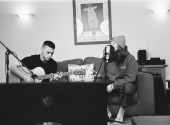
TOP 5 Myths About Music Theory That Hinder Your Musical Development
The usefulness of music theory is a big topic among aspiring musicians. Many musicians claim they don't need it at all. A boring, formal, school-smelling pile of knowledge that only hinders one's journey towards authentic musical expression. Everything we want to know can be easily googled for free, learnt from YouTube tutorials or TikTok music hack videos. Why do we need to know the Phrygian scale or the number of flats in Db major? But isn't this a prejudice that should be left out of a musician's mental toolkit in 2022? Let's take a look at the TOP 5 fundamental misconceptions about music theory that are holding back your musical development.
Recently, I talked with my wife about life experience and, more importantly, the choices that shape our journey in this world. She shared an interesting thought - she wished she could be fifteen years old again, but at the same time have all the experience she has accumulated so far. I couldn't help but agree with her. I would have also planned my life trajectory much better and, most importantly, avoided all the stupidities and wrong decisions that often stemmed from sheer ignorance. One of them is underestimating the knowledge of music theory, which in fact provides an enormous well of inspiration.
1. I only play by ear and by feel
This myth is well fed by famous musicians who shower us with stories about how they never knew how to play music, how their piano teacher told them they had no talent or how they simply play from their heart. Don't fall for it! Many legendary musicians not only knew music theory, they even played from sheet music. The fact that they decided to follow their own path and give way to their original vision of music was often possible because of their diligence and conscientious approach to practising the instrument and studying music.
The singers toiled through boring warm-up exercises for hours, working on their vocal hygiene and technique. But they won't tell you about it in an interview with Rolling Stone. There, the story of prodigious talent and the problems our swan had to overcome on her way from ugly duckling to the heights of show business will work better.
2. Music theory is too complicated
The problem with music theory is reflected in its name. It should sound more like music experience. If you pick up an instrument and try all the theoretical concepts in practice, you will soon gain a deeper insight into what different chord voicing, double fingering, triads, Lydian scales and minor chords in G major sound like. These are all very beautiful sounding and, more importantly, practically applicable skills.
Begin your theoretical journey by studying intervals. It's a great start if you want to learn to feel the distances between notes and the context of chords and scales. Help yourself by associating the interval with familiar melodies and compositions. "Yesterday" starts with a major second down, while "Take on me" has a major seventh up. And if you want to write an epic, upbeat tune, try starting with ascending perfect fourths. Both Ennio Morricone and Elvis Presley knew that.
3. Knowledge of music theory destroys creativity
This is one of the biggest myths that I fell for myself for a few years. Yet Bach, Beethoven, Chopin, Coltrane, Parker, Django Reinhardt, Hendrix, Satriani and Steve Vai were all experts in music theory and endlessly creative artistic souls. It all depends on your approach.
I can understand the argument that too much knowledge of the field and focus on expert details can obscure the broader context and "separate your brain from your heart". But on the other hand, just as you can either use fire to warm yourself up or burn down a village, you can use music theory for your creative pursuits - your deep knowledge will give you the much-needed freedom of expression.
It certainly doesn't hurt to know the relationship between scales and chords, functional harmony in the context of keys, the laws of transposition, voice leading or types of sequences. You can only gain from it - whether for songwriting or for arranging a guitar solo or bass groove.
4. Trial and error
Experience is the best teacher, isn't it? Many people choose to follow their own path and try everything by trial and error. If you are one of those extremely talented, patient and persistent individuals, you can go very far. But in my experience as a bass instructor, I've seen too many cases of students who wasted years wandering around a fingerboard that they didn't even know how many frets it had.
Sooner or later, you'll find out that without structure and a clear goal, your attempts to master an instrument or vocal potential turn into a frustrating struggle with endless dead ends. Knowing music theory gives your efforts a context and a framework. You know where to go and what you've already done.
5. Online world
The last decades have been marked by the rise of YouTube and many other online platforms. You can find everything there, and of course, this also applies to music education. Thousands of attractive videos, blogs and websites flood you with tips and tricks. There's so much... one can drown in it. And that often happens. Instead of spending an hour of focused, concentrated practice on your guitar or bass, you spend an hour watching - or worse, just picking out - videos for your inspiration.
JThe only way out is to have a clear plan, turn off your phone and computer and spend that hour doing focused work on your musical skills. This is where an experienced mentor or tutor will definitely help, keeping you on track, as well as supplying you with time-proven materials. Yes, you can also do it on your own and choose a specific online course, for example.
The biggest challenge is to stay on course, work on good daily habits, not compare yourself to others (especially not all the Insta virtuosos) and take small steps towards your goal - every day to become a better musician than I was yesterday.
Which information from music theory do you find useful in practice and use on a regular basis? Let us know in the comments!
If you have found an error or typo in the article, please let us know by e-mail info@insounder.org.





